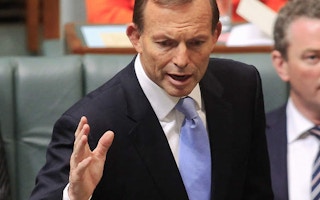An analysis of the Coalition’s direct action climate change policy suggests it will result in Australia substantially increasing its carbon emissions by 2020 rather than reducing them below 2000 levels.
A Climate Action Tracker policy brief suggests that, while Labor’s emissions trading scheme would enable Australia to cut emissions by 5 per cent on 2000 levels, the Abbott government’s policy will not meet the Kyoto target.
“The Abbott government’s proposed direct action program lacks the resources to meet the 5 per cent from 2000 reduction goal and instead could lead to emissions of about 12 per cent above 2000 levels by 2020,” the policy brief states.
Prime Minister Tony Abbott on Wednesday introduced into Parliament a package of bills to repeal Labor’s carbon price.
He has vowed to replace it with direct action, focusing on storing carbon in soil and vegetation.
The policy brief, jointly produced by Climate Analytics, Ecofys and the Potsdam Institute for Climate Impact Research, suggests such carbon sequestration activities are “highly uncertain and unlikely to be viable”.
“[But] our most recent analysis confirms that Australia’s current legislation - if continued - would be sufficient to meet its unconditional [5 per cent] pledge.”
Climate Analytics director Bill Hare said the carbon price would have bent Australia’s upwards emissions curve downwards for the first time. Climate Analytics is a non-profit company based in Berlin.
Its repeal and replacement with a policy that goes against the science will instead see a likely re-carbonisation of the power sector, he said.
The policy brief states Australia’s bipartisan 5 per cent pledge is “inadequate” to keep global warming to 2 degrees and is instead consistent with a temperature increase of up to 4 degrees.
Dr Hare, a lead author of the 2007 Intergovernmental Panel on Climate Change (IPCC) report, believes the Coalition is not interested in serious action.
In Poland for the latest round of UN climate talks, the scientist was critical of the Coalition’s decision not to send Environment Minister Greg Hunt to Warsaw.
“It’s not a good signal; people have commented about it,” Dr Hare told AAP.
“If you are looking at everything that’s been said by the government, the conclusion you have to draw is that the government isn’t very interested in the international negotiations.”
Dr Hare said if the Coalition was genuinely concerned about the lack of ambition in the present round of negotiations “one response would be to come and encourage governments to take further measures”.










